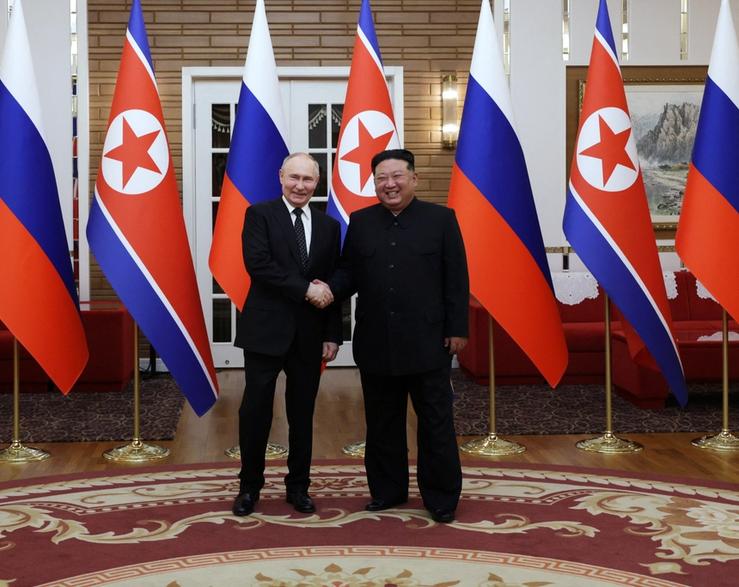The News
Vladimir Putin and North Korean leader Kim Jong Un signed a defense pact on Wednesday as the Russian president received a lavish welcome in Pyongyang, his first visit to North Korea in 24 years.
There are few details of the deal, but the pair are understood to have inked a “mutual assistance” agreement if either country is faced with external “aggression,” as well as a pledge to boost cooperation on health, medical education, and science, according to Russian news agencies.
SIGNALS
Putin will be wary of rankling Seoul and Beijing
Even as Putin strengthens ties with Pyongyang, he will be keen to keep the door open with neighboring South Korea — Russia’s fifth-largest export destination before its full-scale invasion of Ukraine — The Economist argued. Another neighbor looms even larger: “Big Brother is always watching from Beijing,” a North Korea expert told the newspaper. Putin was reportedly discouraged by Chinese officials from traveling directly to Pyongyang following his visit to Beijing last month, perhaps because Xi Jinping “fears the optics” of belonging to a triangular axis of evil, Time magazine’s former China Bureau Chief wrote — and ultimately, China is “the only backer that really matters” to Moscow.
China may feel conflicted about the Russia-North Korea alliance
North Korea taking steps to diversify its alliances represents a double-edged sword for China: While somewhat relieved of its responsibility to provide Pyongyang with international cover, as well as goods and food, Beijing has also found its influence diminished, Le Monde’s Beijing correspondent argued. Precisely how North Korea may further future expansion of its nuclear missile program is slipping further from Chinese control, creating “major uncertainty,” a nuclear specialist at the Carnegie China research center told the publication.
Any Russian support for Pyongyang’s nuclear ambitions may not last
Of most concern about Russia-North Korean military cooperation is what Putin might be giving Kim to modernize his nuclear arsenal, the former director for Asian Affairs on the US National Security Council wrote in the Center for Strategic and International Studies. Such moves would indeed “turbo charge” the threat North Korea poses to South Korea, the US, and Japan, but much depends on what happens in Ukraine: A swift end to the war would see Putin less dependent on North Korea for munitions, and therefore less willing to share sensitive technologies, a columnist noted in the Council on Foreign Relations.



